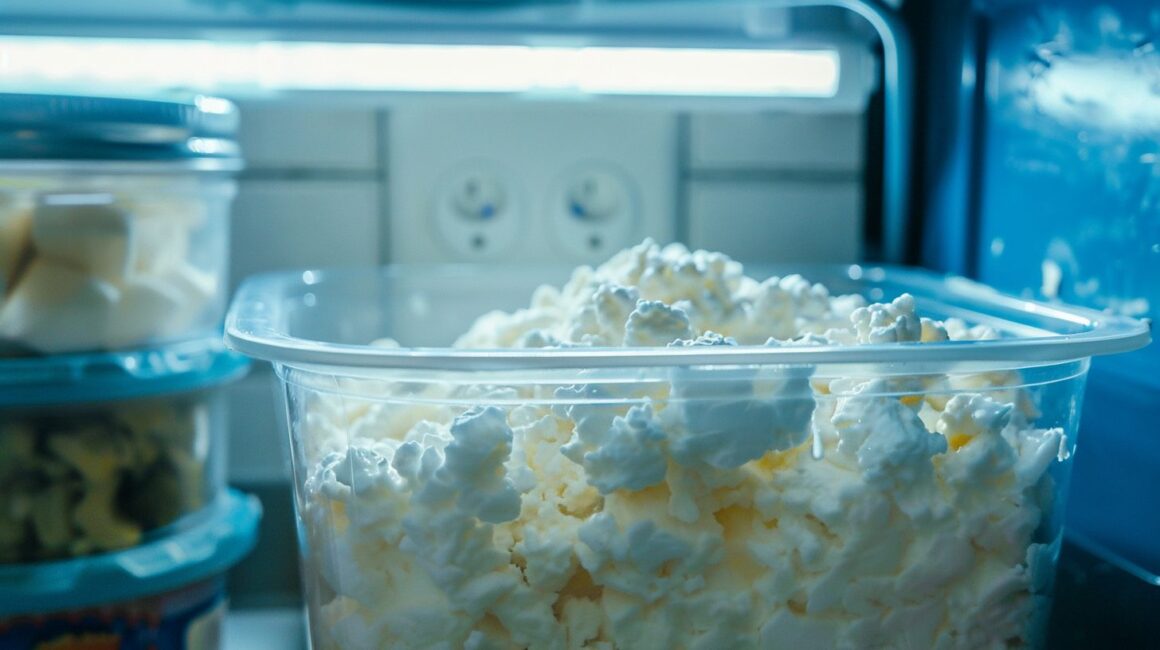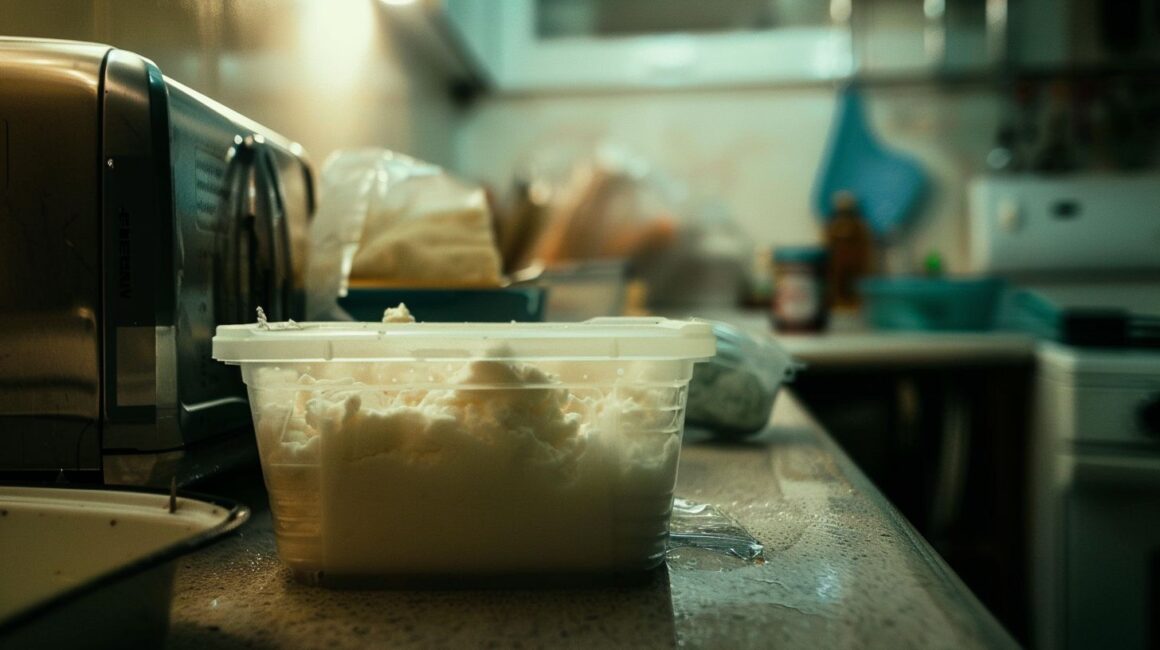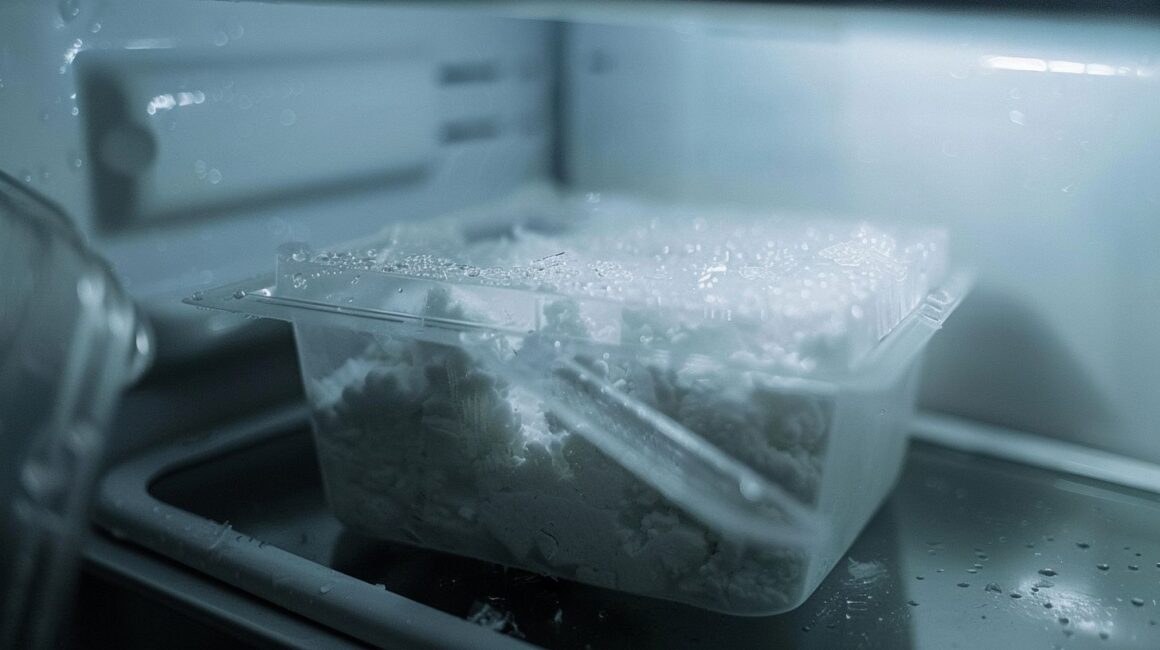You opened your fridge, hoping to whip up your favorite cottage cheese snack, but then you remember you bought extra last week. Can you even freeze cottage cheese?
It’s true, freezing cottage cheese can change its texture a bit. But don’t worry, this article will show you the best ways to freeze and thaw cottage cheese to keep it as delicious as possible.
Ready to become a cottage cheese-freezing pro? Keep reading!
Key Takeaways
- Freezing is possible but expect some changes. Cottage cheese, especially low-fat versions, might become a bit watery or grainy after being frozen and thawed.
- For best results, freeze full-fat cottage cheese. It has a lower water content than low-fat cottage cheese, so it holds up better in the freezer.
- Frozen cottage cheese is best used in cooked dishes. Think lasagna, casseroles, or even pancakes! The texture difference won’t be as noticeable in these dishes.
- Properly stored cottage cheese can last for a while in the freezer. Unopened containers can last up to 3 months, while opened containers are good for about 2 months.
- Freeze cottage cheese in ice cube trays for easy portioning. This is a great way to have small amounts ready to go for your recipes.
Can You Freeze Cottage Cheese?
Freezing cottage cheese is possible. However, be prepared for potential changes in texture and taste after freezing.
Full fat cottage cheese tends to freeze better
Full-fat cottage cheese, with its lower water content, tends to hold up better in the freezer compared to its lower-fat counterparts. Freezing cottage cheese, however, can lead to some changes.
Expect a slightly more lumpy, watery consistency after thawing. This change in texture happens because the freezing process affects the cheese curds. While not ideal for eating plain, frozen cottage cheese works well in cooked dishes where texture is less noticeable, such as Store Cornbread. The altered consistency blends seamlessly when mixed into cornbread batter, making it a practical addition to enhance flavor without compromising the dish.
Think lasagna, casseroles, situations where its creamy nature is an asset.
Texture and taste may change when frozen
Freezing cottage cheese? It’s possible, but the texture and taste might not be the same. Think of it like this: imagine freezing and thawing lettuce, it just wouldn’t be the same, right? Cottage cheese, especially low-fat versions, has high water content.
Water expands when frozen, which can make the texture grainy or watery after thawing. The flavor can also be affected, sometimes becoming slightly less vibrant. My friend, a chef, once told me he froze some cottage cheese and found it best for cooked dishes afterward, like lasagna, where the texture difference wouldn’t be as noticeable.
So, while you can freeze cottage cheese, especially if it’s full-fat and you plan to use it in cooked dishes, don’t expect it to be exactly like fresh cottage cheese.
Can be frozen for 3 months (unopened) or 2 months (opened)
Cottage cheese can last in the freezer for up to three months unopened. Once you open the container, it’s best to use it within two months. Freezing cottage cheese for longer periods might affect its taste and texture, so pay attention to the expiration date.
You can always freeze the cottage cheese in smaller portions using ice cube trays for easier use later.
Recommended Ways to Freeze Cottage Cheese
Freezing cottage cheese is simple. You only need a good container and a little preparation. Read on to discover the best techniques for freezing your cottage cheese.
Use an airtight container or freezer-safe bag
Freezer-safe plastic containers or freezer-quality bags are your best bet for freezing cottage cheese. Remove excess air from the bag using a straw before sealing for best results.
Cottage cheese can last for three to six months unopened and two months opened in the freezer. However, remember, freezing impacts the texture of the cheese, it might be grainier.
That’s why it’s best used in cooked dishes like lasagna or as a topping, where the texture difference won’t be as noticeable.
Remove excess air before sealing
Squeezing out air before sealing helps prevent freezer burn and maintains the cottage cheese’s quality. Freezer burn can make your cottage cheese dry. It can also negatively affect the taste and texture.
Properly sealed cottage cheese, whether full-fat or low-fat, can last up to three months unopened in the freezer. Opened cottage cheese lasts about two months in the freezer if appropriately stored.
Label with date and amount
Clearly label your container or bag with the date you froze the cottage cheese. This helps you track its time in the freezer – remember, three to six months unopened and two months opened is best.
Noting the amount, like “2 cups” or “half container,” helps when you later want to use it in a recipe.
How to Thaw and Use Frozen Cottage Cheese
Thaw the frozen cottage cheese in your refrigerator overnight, and then, use it in cooked dishes or as a topping, but there’s more to discover!
Thaw in the refrigerator overnight
Remove your cottage cheese from the freezer. Place the container in your refrigerator. Allow it to defrost overnight. Cottage cheese with higher water content freezes at a higher temperature.
It is not recommended to freeze cream cheese. Cream cheese may lose texture and quality. Freezer-safe plastic containers or freezer-quality bags are best. Cottage cheese can last three to six months unopened in the freezer.
Opened cottage cheese lasts about two months in the freezer. You can use thawed cottage cheese in cooked recipes like lasagna.
Can be used in cooked dishes or as a topping
You can absolutely use thawed cottage cheese in your favorite recipes! It works well in things like lasagna or biscuits. Want to add a dollop of something tasty to your baked potato or scrambled eggs? Thawed cottage cheese can also be used as a topping for various dishes.
Remember, cottage cheese, especially if it’s low-fat, might have a slightly different texture after freezing. It’s best to use it in cooked dishes where the texture difference won’t be as noticeable.
Other Tips for Using and Freezing Cottage Cheese

Higher fat content freezes better
Full-fat cottage cheese freezes better than low-fat varieties. Cheeses with higher water content freeze at higher temperatures. This causes ice crystals to form, which can affect the texture of the cottage cheese upon thawing.
I always buy full-fat cottage cheese and freeze it for later use. It lasts for up to three months in my freezer, and I use it in my lasagna recipe.
Cottage cheese can be used as a substitute for ricotta
Cottage cheese can be a good substitute for ricotta in a pinch, especially in cooked dishes like lasagna. Remember that cottage cheese has a different texture and slightly tangier flavor than ricotta.
It’s a good idea to use full-fat cottage cheese for a creamier result. You can freeze cottage cheese for later use, but its texture may be altered. Cheeses with higher water content, like cottage cheese, freeze at higher temperatures.
Use frozen cottage cheese in cooked dishes like pasta sauces or soups.
Can be frozen in ice cube trays for easy portioning
Freezing small portions of cottage cheese in ice cube trays is a convenient trick. It allows you to remove a portion. This is helpful if you want to freeze, then thaw and use cottage cheese later.
Full-fat cottage cheese freezes better than low-fat. Remember, freezing affects the texture. It’s a good idea to freeze for cooked dishes. Frozen cottage cheese can last three months unopened and two months opened.
Conclusion
So, you *can* freeze cottage cheese, but it might get a little watery. Stick with full-fat for best results—it handles the deep freeze better. Portion it out into airtight containers or freezer bags, squeezing out as much air as possible.
Thaw overnight in the fridge, then use it in your favorite recipes—think lasagna or pancakes! Remember, freezing is a lifesaver, but nothing beats that fresh, tangy flavor. Stock up, experiment, and enjoy!
FAQs
1. Can I freeze cottage cheese?
Yes, but it might change texture.
2. What’s the best way to freeze cottage cheese?
Freeze it flat in a freezer bag, squeezing out extra air.
3. How do I thaw frozen cottage cheese?
Thaw it in the refrigerator overnight.
4. What can I do with thawed cottage cheese?
Use it in recipes where texture isn’t as important, like dips or smoothies.
5. Any tips for freezing cottage cheese?
Use it within 2 months for best quality.

Melissa Fannin, a 34-year-old with a flair for design and a wealth of experience, has spent seven years honing her skills in the realms of decoration and home improvement writing. Her academic journey laid a solid foundation for her creative pursuits, earning her a Bachelor of Science degree in Architecture from a prestigious institution in Newark, New Jersey 07102, USA.
Armed with a background in architecture, Melissa brings a unique perspective to the world of home aesthetics. Her articles seamlessly blend artistic vision with practical insights, offering readers a comprehensive guide to enhancing their living spaces. Melissa’s passion for creating visually appealing and functional environments has made her a standout figure in the field.
Currently serving as a Senior Editor at Home and Around Blog, Melissa plays a pivotal role in curating content that inspires and informs readers about the latest trends and innovative approaches to decoration and home improvement. Her writing not only reflects her expertise but also serves as a source of inspiration for those looking to elevate their living spaces. Melissa Fannin continues to shape the discourse around home design, bringing a fresh and knowledgeable perspective to the ever-evolving world of decoration and home improvement.




